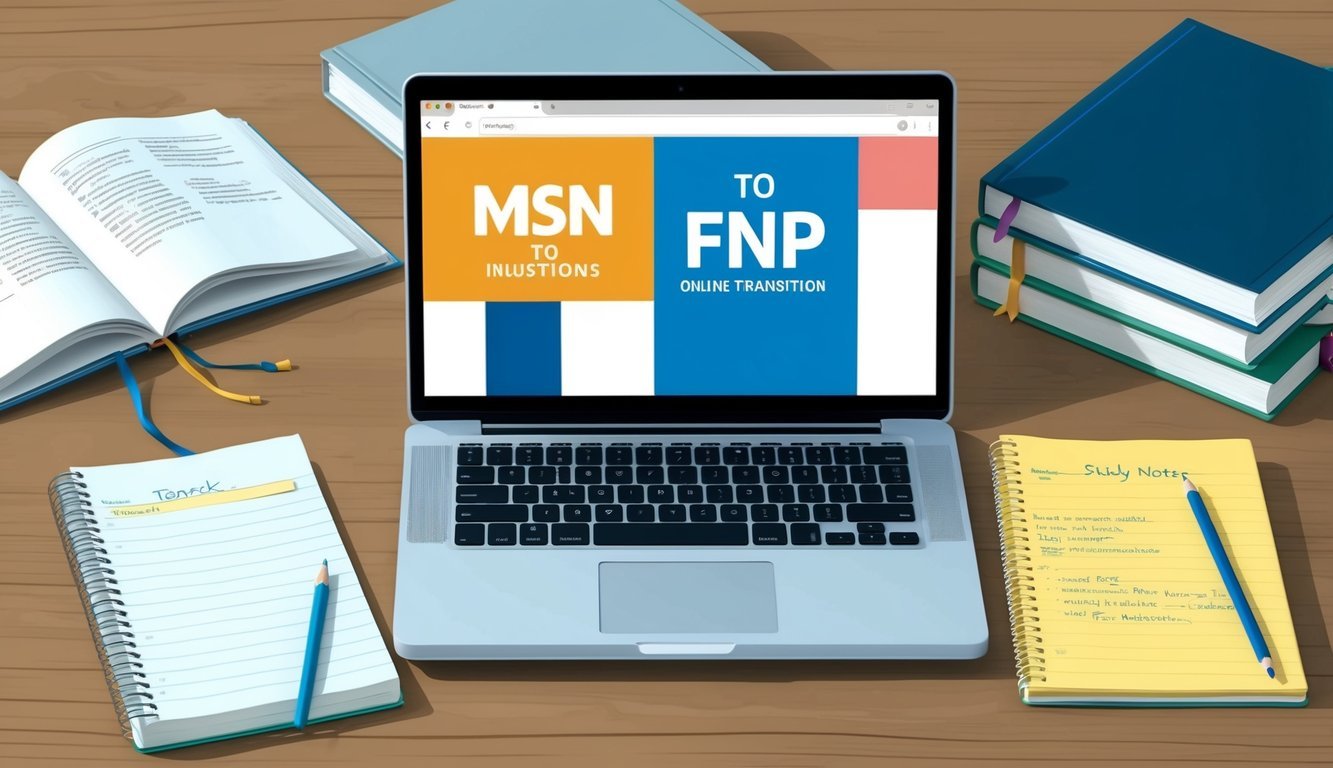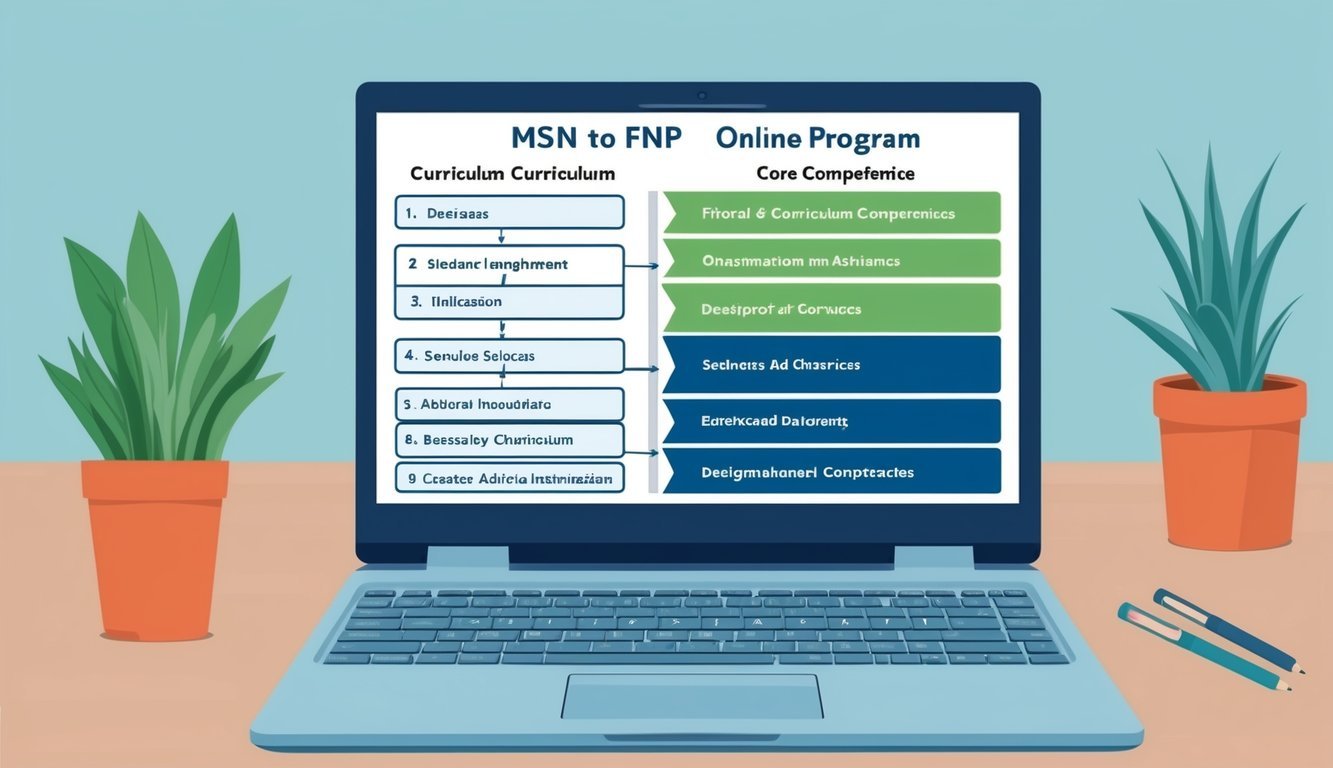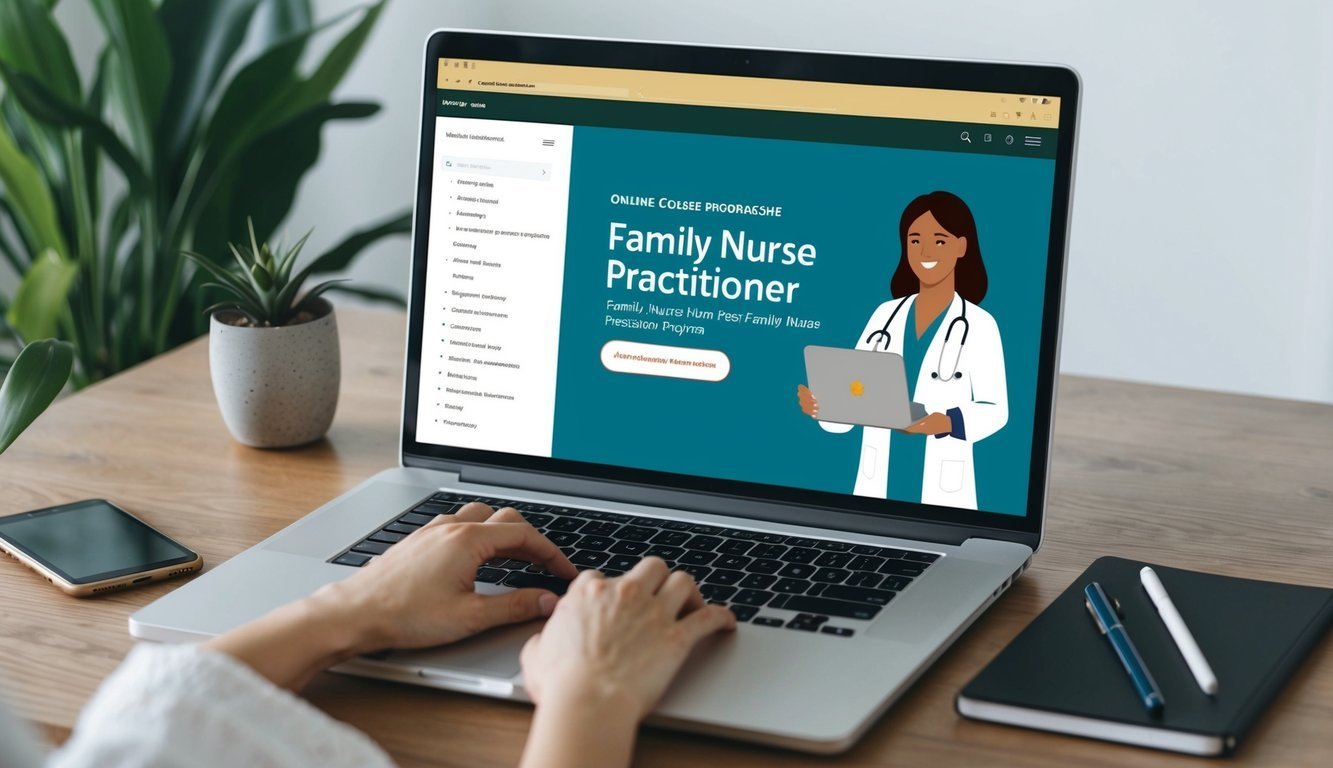Transitioning from an MSN to an FNP online program can be a rewarding step in your nursing career.
Completing this advanced degree will help you gain the skills needed for a more impactful role in patient care.
This journey not only enhances your clinical abilities but also opens doors to new opportunities in the healthcare field.
You can expect the curriculum to cover essential competencies, preparing you for the responsibilities of a Family Nurse Practitioner.
With the flexibility that online programs offer, you can balance your studies with work and personal commitments.
Many accredited institutions provide comprehensive resources to support your learning and professional growth.
Moreover, understanding the certification process and clinical requirements is crucial for your success.
The ability to apply theoretical knowledge in real-world settings is what truly sets apart effective nurse practitioners.
Whether you aim to work in hospitals, clinics, or private practices, the MSN to FNP transition will position you at the forefront of patient care.
Key Takeaways
- An MSN to FNP online program enhances your clinical competencies.
- Accreditation and standards are essential for quality education.
- The transition leads to diverse career opportunities in healthcare.
Exploring the MSN to FNP Online Transition

Transitioning from a Master of Science in Nursing (MSN) to a Family Nurse Practitioner (FNP) role online provides a flexible and advanced option for your nursing career.
You can pursue advanced practice and expand your scope of practice while balancing personal and professional commitments.
Understanding the MSN-FNP Pathway
The MSN-FNP pathway is designed for those who already hold an MSN degree.
In this program, you will gain specialized knowledge and skills in family healthcare.
The curriculum includes topics such as healthcare management, preventive care, and patient assessment.
To enroll, you may need to meet requirements including:
- Holding an active RN license
- A bachelor’s degree in nursing (BSN to MSN programs are also available)
- Completion of prerequisite coursework
Most programs offer a blend of online coursework and clinical practice.
This format not only supports a busy lifestyle but also allows you to collaborate with peers and faculty in real-time.
Advantages of Online MSN-FNP Programs
Online MSN-FNP programs offer several benefits that can enhance your learning and career trajectory.
Flexibility: With online classes, you can study at your convenience.
This is ideal for working nurses who need to balance shifts with education.
Accessibility: You can access materials and lectures from anywhere, making it easier to fit learning into your schedule.
Cost-Effectiveness: Online programs often have lower overall costs, such as commuting and housing.
Here’s a quick comparison table of advantages:
| Advantage | Description |
|---|---|
| Flexibility | Study at your own pace, fitting learning around work and life. |
| Accessibility | Learn from anywhere with internet access. |
| Cost-effectiveness | Typically reduced expenses compared to traditional programs. |
Transitioning to an FNP role can expand your career opportunities, allowing you to provide comprehensive care to diverse populations.
Programs like those at Samuel Merritt University and George Mason University can support your journey toward becoming a Family Nurse Practitioner.
Accreditation and Educational Standards
Accreditation is crucial for ensuring the quality and credibility of your education when pursuing an MSN to FNP program.
Understanding the role of accrediting bodies helps you make informed decisions about your educational path.
Commission on Collegiate Nursing Education (CCNE)
The Commission on Collegiate Nursing Education (CCNE) is a recognized accrediting body for nursing programs in the United States.
It evaluates programs to ensure they meet quality standards in nursing education.
CCNE accreditation is important for MSN programs, especially those focused on Family Nurse Practitioners (FNP).
Programs that receive CCNE accreditation have demonstrated compliance with established criteria, including:
- Curriculum Quality: Programs must offer an effective curriculum that prepares you for advanced practice.
- Faculty Qualifications: Educators should hold necessary credentials and experience to teach FNP courses.
- Student Outcomes: Programs are assessed on their ability to graduate competent, well-prepared nurse practitioners.
For more details on CCNE credentials and standards, you can visit their official site at CCNE Accreditation.
Accreditation Importance in FNP Programs
Accreditation significantly impacts your educational experience and future career.
Choosing an accredited FNP program ensures that you receive quality education that meets industry standards.
Key benefits of attending an accredited program include:
- Eligibility for Certification: Most certifying bodies require graduation from an accredited program for candidacy.
- Better Career Opportunities: Employers often favor graduates from accredited programs.
- Federal Financial Aid: Accreditation is often a requirement for federal student aid eligibility.
In addition, accredited MSN programs maintain high academic standards, which is vital for your success in a competitive field.
Programs like the MSN-FNP at George Mason University provide a comprehensive foundation that aligns with accreditation standards.
Curriculum and Core Competencies

The curriculum for an MSN to FNP (Family Nurse Practitioner) online program is designed to equip you with essential knowledge and skills.
You will engage in core courses that cover vital topics such as health assessment, pharmacology, and evidence-based practice.
The program also emphasizes the importance of health promotion and understanding social determinants of health.
Essential MSN-FNP Courses
In your MSN-FNP program, you will study several key courses.
Important subjects include:
- Health Assessment: Learn techniques for gathering patient data.
- Pathophysiology: Understand disease processes and their impact on health.
- Pharmacology: Explore medication management and pharmacotherapeutics.
- Biostatistics: Gain skills in interpreting health data.
These courses are designed to bolster your clinical judgment and decision-making.
You will also engage in Evidence-Based Practice, teaching you how to use research to inform patient care.
Programs like those offered by George Mason University emphasize both theory and practical application.
Developing Advanced Practice Skills
As you progress, you will develop advanced skills critical for effective patient care.
These skills include:
- Health Promotion: Strategies to educate patients on healthy lifestyles.
- Population Health: Understanding health trends among specific communities.
- Social Determinants of Health: Examining how factors like income and education affect health outcomes.
By integrating these competencies, you prepare to address diverse patient needs in various settings.
With programs such as WGU, you can expect a robust curriculum that prepares you for real-world challenges in healthcare.
Clinical Requirements and Immersion

To become a Family Nurse Practitioner (FNP) through an online MSN program, you must complete specific clinical requirements.
This includes acquiring both clinical hours and hands-on direct care experience.
Immersion experiences also play a key role in reinforcing your skills in real-world settings.
Clinical Hours and Direct Care Experience
You will need to accumulate a certain number of clinical hours, typically around 500 to 700, focusing on direct patient care.
These hours are crucial for developing your advanced practice skills.
The specific number may vary by program.
Your clinical practice will generally occur in primary care settings and may also involve specialized areas such as pediatrics or geriatrics.
Here’s a typical breakdown:
| Type of Experience | Hours Required |
|---|---|
| Primary Care Settings | 300-500 hours |
| Specialized Clinics | 200-300 hours |
This experience allows you to apply theoretical knowledge gained through coursework in real patient interactions.
Finding and Utilizing Clinical Sites
Finding the right clinical sites for your immersion can be vital for your education.
Many programs have established partnerships with local healthcare facilities.
You can reach out to various organizations like hospitals, clinics, and community health centers.
Always confirm that these sites meet your program’s requirements.
Utilize program resources to help identify suitable sites.
Additionally, consider networking with professionals in the field, as they may offer opportunities not publicly advertised.
Participating in these sites will enhance your experience and confidence, preparing you for the responsibilities of an FNP role.
Certification and Licensure
Becoming a Family Nurse Practitioner (FNP) requires completing necessary certifications and obtaining state licensure.
This process ensures you are qualified to provide quality care to patients.
Preparing for the FNP Certification Exam
To become certified as an FNP, you must pass a certification exam.
The two main certifying bodies are the American Association of Nurse Practitioners (AANP) and the American Nurses Credentialing Center (ANCC).
Each organization offers a national certification exam.
You should review the exam content outlines provided by the AANP and ANCC.
This will guide your study efforts and focus on the critical areas.
Common topics include:
- Health Assessment
- Diagnosis and Management
- Pharmacology
- Professional Issues
Consider enrolling in a preparatory course to enhance your readiness.
After passing the exam, you will receive either an AANP or ANCC certification, which is essential for practicing as an advanced practice nurse.
State Licensure for Family Nurse Practitioners
Once certified, you must obtain licensure in your state to practice as an FNP.
Each state has different requirements, so it’s vital to check the specific regulations in your state.
Generally, you will need:
- A valid RN license
- Proof of your FNP certification
- A completed application for licensure
You may also need to provide documentation like transcripts from your BSN program.
Some states require a background check and continuing education for license renewal.
You can find more details about your state’s requirements through the Nurse Licensure Compact (NLC) or your state’s nursing board website, ensuring you meet all necessary criteria to practice safely and effectively.
Career Opportunities and Outcomes
As a Family Nurse Practitioner (FNP), you can look forward to a range of career opportunities fueled by significant industry trends.
Understanding employment trends and avenues for career advancement are crucial for making informed decisions about your future.
Employment Trends for FNPs
The demand for Family Nurse Practitioners is on the rise.
According to the Bureau of Labor Statistics, nurse practitioners expect a 45% employment growth from 2020 to 2030.
This rapid increase is driven by an aging population and a greater need for healthcare providers, especially in primary care settings.
FNPs play a vital role as primary care providers.
They are often the first point of contact for patients, providing essential services such as diagnosing illnesses, developing treatment plans, and performing routine check-ups.
The healthcare industry has a pressing need for qualified FNPs to meet this demand.
| Role | Projected Growth Rate |
|---|---|
| Nurse Practitioners | 45% |
| Family Nurse Practitioners | High demand |
Advancing Your Nursing Career
Transitioning from a Master of Science in Nursing (MSN) to FNP opens doors for career advancement.
You can pursue further qualifications such as a Doctor of Nursing Practice (DNP).
A DNP can enhance your skills and increase your earning potential as a healthcare leader.
You may also explore tuition assistance programs.
Many institutions offer financial support to students pursuing FNP programs.
This support can help ease the financial burden while you advance your education.
Engaging in continuing education and professional development can also expand your knowledge and improve your clinical skills.
Continuous learning is essential in staying updated with the latest medical practices, ensuring you provide high-quality care.
With these career opportunities, you can position yourself as a sought-after healthcare provider.
Frequently Asked Questions

In this section, you’ll find answers to common questions about online programs for Family Nurse Practitioners (FNP).
This includes information on specific programs, admission requirements, and cost-effective options.
What online programs are available for a 12-month FNP course?
Many universities offer accelerated online FNP programs that can be completed in about 12 months.
Programs such as the one at Cleveland State University provide a pathway to certification through a Master of Science in Nursing.
Which universities in Texas offer the best online FNP programs?
In Texas, several universities stand out for their online FNP programs.
Notable options include Texas Woman’s University, the University of Texas at Arlington (UTA), and Baylor University.
Each of these institutions has a strong reputation for nursing education and offers online learning flexibility.
How can I find the most affordable FNP online program in Texas?
To find affordable online FNP programs in Texas, research tuition costs and available financial aid.
Institutions like Carson-Newman provide competitive pricing, while you can compare costs across schools like Texas Southern University or UTA.
What are the admission requirements for the UTA FNP online program?
Admission requirements for the UTA FNP online program often include a valid RN license, a BSN degree, and a minimum GPA.
Additional materials such as letters of recommendation and a personal statement may also be required.
Are there any comprehensive reviews of the UTA online FNP program from graduates?
Yes, there are reviews available from UTA online FNP graduates.
These reviews provide insights into the program’s structure, faculty support, and overall experience.
Check platforms like NursingProcess.org for detailed opinions and evaluations.
What are the distinctions between BSN to FNP and MSN to FNP programs at UTA?
The BSN to FNP program is designed for those with a Bachelor of Science in Nursing.
Meanwhile, the MSN to FNP program is aimed at nurses who already hold a Master’s degree.
The MSN program may cover advanced practice topics in greater depth, preparing you for higher-level roles in healthcare.

